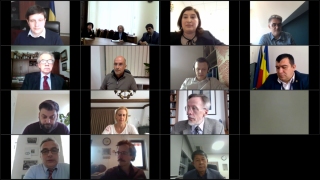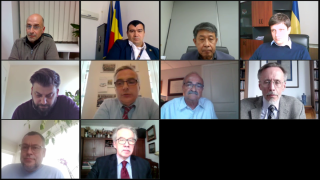 On 5 May 2020 ACEEEO held an Online Symposium focusing on the consequences of COVID-19 on elections. The circa 80 attendees from more than 35 countries representing International Organizations, Electoral Management Bodies (EMBs), Non-Governmental Organizations and Universities from across the globe have had the chance to get acquainted with the challenges and solutions of holding elections under the threat of COVID-19 pandemic. The Symposium focused on Poland, where the Presidential Election was supposed to be held on 10 May, and South Korea, where elections were held on 15 April amidst the epidemic.
On 5 May 2020 ACEEEO held an Online Symposium focusing on the consequences of COVID-19 on elections. The circa 80 attendees from more than 35 countries representing International Organizations, Electoral Management Bodies (EMBs), Non-Governmental Organizations and Universities from across the globe have had the chance to get acquainted with the challenges and solutions of holding elections under the threat of COVID-19 pandemic. The Symposium focused on Poland, where the Presidential Election was supposed to be held on 10 May, and South Korea, where elections were held on 15 April amidst the epidemic.
The Symposium was opened by Zsolt Szolnoki (Secretary General, ACEEEO), who greeted the audience, introduced the speakers, and emphasized that ACEEEO’s aim was to provide a platform for a fruitful discussion. Mr. Szolnoki then gave the floor to Tamar Zhvania (President, ACEEEO), who opened the Symposium by emphasizing the utmost importance of the topic of elections and the multidimensional nature of the challenges posed by COVID-19 that calls for the exchange of experiences. Ms. Zhavnia noted that EMBs face a unique situation and they need to adapt to the new challenges and to introduce procedures that makes it possible to hold elections. For this end, EMBs need to monitor the elections taking place around the world, and this task is helped by events like this Symposium. The general part of the discussion was closed by János Mécs (Project Manager, ACEEEO), who shared insights regarding the general challenges and considerations with regard to elections in times of epidemic. Mr. Mécs highlighted that as it is shown by the diverse reactions by countries whether to hold or postpone elections, there is no single good solution, as there are competing considerations on both sides. ACEEEO has adopted preliminary recommendations based on an analysis of its partners’ reports highlighting the importance of the integrity of elections, high turnout, informing voters, health considerations, and the preparation of election officials.
The Symposium continued with the discussion on the Polish experience. The first speaker, Krzysztof Lorentz (Head of the Department, National Electoral Office of Poland) described the legal background and the steps that had been taken to hold elections, emphasizing that only a few days before the elections the legal and other infrastructure related to among others postal voting was under construction, creating a highly difficult, if not impossible situation with regard to organizing the elections. Mr. Lorentz noted that postal voting was supposed to be provided only a small group of voters, however, the Draft Act – that at time of the Symposium was not adopted yet – made the vote completely postal voting, and involved bodies other than EMBs to conduct the elections. Mr. Lorentz noted that special situations require special solutions and it is up to politicians to solve these problems and election officials are responsible to organize elections according to the applicable legal provisions. However, as these rules are not set short time prior to the elections, election officials are left in an ambiguous situation.
The presentation of Mr. Lorentz was followed by the contribution of Wojciech Hermeliński (Former Chairman of the National Election Commission, Former Judge of the Constitutional Tribunal of Poland), who pointed out that it is not sure that Poland was indeed going to have elections considering the state of the organization, and that nobody knows whether the elections would be held, and how would it be held. Mr. Hermeliński noted that the Draft Law was passed at the beginning of April in the Sejm in spite of the jurisprudence of the Constitutional Tribunal prohibiting changes of the electoral legislation after six months prior to elections, and in violation of the internal regulation of the Sejm, without engaging in discussion in any of the relevant stakeholders. The Draft Act was before the Senate at time of the Symposium, therefore the preparations (e.g. printing out materials) were made without an adopted and firm legal background, and the law may be rejected by the Sejm. Moreover, only one month prior to the elections the state election commission was removed from the duty, and the task was moved to the representative of the administration. Mr. Hermeliński concluded that this procedure puts into question the effective organization of the upcoming elections.
 The third speaker, Alexander Shlyk (Head of the Election Department, OSCE/ODIHR), gave an overview of the Legal Opinion on the Draft Act. The Legal Opinion focused on how changes were made in the Sejm, concluding that the adoption was carried out in a very quick manner, leaving out important stakeholders, therefore OSCE/ODIHR recommended that changes should be made in a more inclusive procedure. As to the stability of electoral law, Mr. Shlyk emphasized that a lot of practical consequences arose, therefore background legislation and thorough preparation is needed, thus it is recommended that changes are adopted well advance of the elections. Moreover, the provision that the Speaker may determine the date of elections should be reconsidered. Furthermore, the reallocation of key competences from the electoral commission to the member of the government is questionable due to the latter institution’s lack of experience and the former institution’s primary function to organize elections. Further recommendations were made to the appointment election offices.
The third speaker, Alexander Shlyk (Head of the Election Department, OSCE/ODIHR), gave an overview of the Legal Opinion on the Draft Act. The Legal Opinion focused on how changes were made in the Sejm, concluding that the adoption was carried out in a very quick manner, leaving out important stakeholders, therefore OSCE/ODIHR recommended that changes should be made in a more inclusive procedure. As to the stability of electoral law, Mr. Shlyk emphasized that a lot of practical consequences arose, therefore background legislation and thorough preparation is needed, thus it is recommended that changes are adopted well advance of the elections. Moreover, the provision that the Speaker may determine the date of elections should be reconsidered. Furthermore, the reallocation of key competences from the electoral commission to the member of the government is questionable due to the latter institution’s lack of experience and the former institution’s primary function to organize elections. Further recommendations were made to the appointment election offices.
The discussion then moved to the South Korean case, where elections were held successfully on 15 April. Antonio Spinelli (Senior Advisor, Electoral Processes and Political Participation and Representation, Asia and the Pacific Regional Programme, International IDEA) presented on the challenges, the measures that were introduced, and the key insights. Mr. Spinelli emphasized that when deciding on holding elections, key factors such as type of the election, time available, and the current state of pandemic should be considered as well as the possibility of holding legitimate elections while keeping the integrity of the institution and the health of the voters. South Korea faced a double challenge; to minimize the health risks and to reassure the voters that the environment is indeed safe. Mr. Spinelli highlighted that voting in advance was an important measure as well as mail voting and making it possible that quarantined voters may leave their designated place and vote after the officials voting hours. Strict hygiene policies were put to place regarding all types of participants (security personnel, media, etc.). Information was effectively disseminated, moreover, polling stations provided regular live streams. Voting abroad posed challenges, and social distancing affected campaign to a considerable degree. Mr. Spinelli concluded that the safe conduct and high turnout should be regarded as a success, and there is much to learn from the South Korean experience, however, this success may not be easily adopted to other context, therefore when drawing insights from the said election, countries should carefully evaluate their own context – capacity to contain the spread of the virus; previously existing absentee voting system; availability of resources; political environment; civic duty and multilateral cooperation.
The next speaker, Juhwan Lee (Director of Training Department, Association of World Election Bodies) first highlighted that postponement of election was not considered as an option in South Korea, the question was thus how the election should be held. The aim was to keep people safe, provide legitimacy and guaranteeing the right to vote. Various safety measures were put in place, for the election officials, election campaign was reduced, and the voting procedure was secured (e.g. by temperature measurement at polling stations or setting up special voting stations for infected). The speaker noted that an important factor was an effective cooperation with government agencies, as well as early voting and keeping the spread of the virus at bay. Mr. Lee also highlighted that the South Korean example may not be applicable because of the differences in capacity and the available resources. Moreover, in hindsight the election was held when the epidemic was successfully contained.
The session was followed by a Q&A Session. Questions touched upon regarding Korea: putting together voter registration, mobilization and training of election workers, extra budget needed, possibilities of online voting; and regarding Poland: the reaction of political parties to the changes.
The Symposium was concluded by Paul DeGregorio (Honorary Member, ACEEEO), who pointed out that the U.S. also deals with this situation, where many states decided to cancel or postpone elections. The big debate is about mail balloting, the favor of which is divided along partisan lines. Absentee voting is also a topic of debate. Many states are looking at South Korea, and how they can conduct elections and keep voters safe at the same time. Also, poll workers in the age between 60 and 80 are more endangered and thus there may be a lack of polling station workers. Mr. DeGregorio encouraged events like the current Symposium as they provide a useful forums for exchanging experiences. Zsolt Szolnoki closed the meeting by announcing that in the first week of June a similar meeting would be held.
Save the dates: the next Online Symposium will be held on 4 June at 2 PM (CET).

